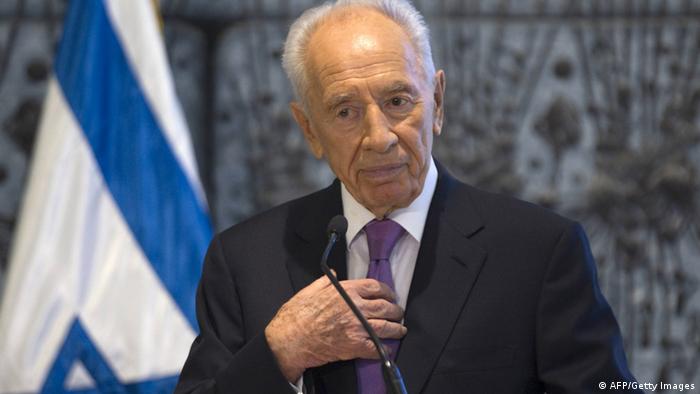Opinion: Peres departure marks the end of an era
Opinion: Peres departure marks the end of an era
There was a time when peace in the Middle East seemed to be within reach, and Israeli President Shimon Peres was an icon of that era. As he leaves office, we are left with hatred and hardliners, says DW's Peter Hille.
Jerusalem in the autumn of 1999: Shimon Peres, then minister for regional cooperation, stands at a podium to talk about the peace process. He smiles warmly at his Palestinian co-panelist Ziad Abu-Zayyad, minister of state for the Palestinian Authority.
Peace has been reached on a diplomatic level, Peres said. Now, Israel will bring an end to its control over the lives of Palestinians. It will stop expanding settlements and will enable economic growth among Palestinians in order to secure peace.
A complete failure
Fifteen years later and none of that has become a reality. Instead, rockets are raining down on Israel from Gaza, killing innocent people. Israel is firing back with all guns blazing, killing hundreds of innocent Palestinians. Shimon Peres has failed. And miserably so. Why? Because not enough Israelis and Palestinians were ready to give peace a chance.
But back then, in 1999, euphoria was the prevailing emotion. Euphoria for peace. I felt that way, too. After the panel discussion, I went straight to Peres to ask the Nobel peace laureate for his autograph. Excuse the fan-boy behavior - I was a teenager back then, and Peres deeply impressed me.
Architect of the Oslo Agreement
After all, he was the man who, together with Yasser Arafat and Yitzhak Rabin, had realized in 1994 that making peace would be the only way to bring peace to the Middle East. He worked hard for that, as chairman of the Labor Party, foreign minister, prime minister and then as president.
Of course, he is also the man who acquired arms from all around the world to secure Israel after it had declared independence in 1948. He later turned Israel into a nuclear power with the help of France and the United States. And when he chose to enter Ariel Sharon's government in 2001, he became part of a team that reversed the Oslo Peace Accords.
The return of the hardliners
Yet, the end of Peres' term still marks the end of an era that was full of hope for peace. Doves like Peres or Abu-Zayyad have long been losing ground among Israelis and Palestinians. Those who believe that bombs and rockets will solve the conflict are calling the shots on both sides now. On the Palestinian side, this process started - at the latest - with the death of Yasser Arafat in 2004 and the rise of Hamas. But proponents for a peaceful coexistence and a two-state solution are currently hard to find among Israel's political elite as well.
It's regrettable that when Peres steps out of the political spotlight, Israel will lose a president who clearly wanted peace. Not by any means necessary or at any price but with sincere conviction. dw de


Comments